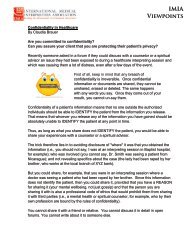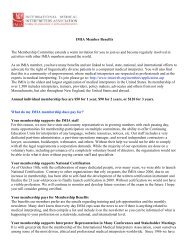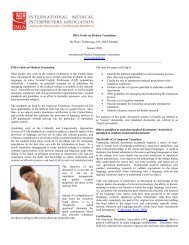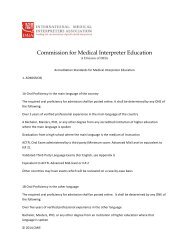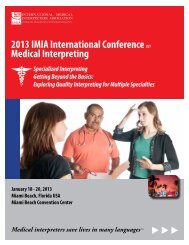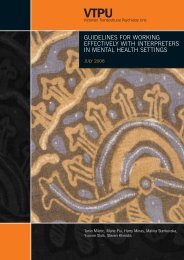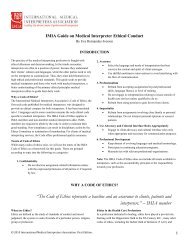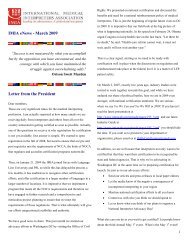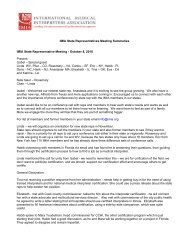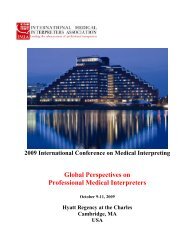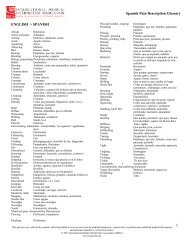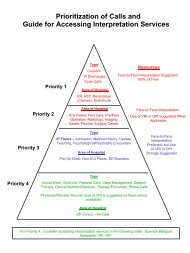improving the quality of mental health interpreting in victoria
improving the quality of mental health interpreting in victoria
improving the quality of mental health interpreting in victoria
Create successful ePaper yourself
Turn your PDF publications into a flip-book with our unique Google optimized e-Paper software.
Executive Summary<br />
Converg<strong>in</strong>g (but anecdotal) evidence has <strong>in</strong>dicated that <strong>the</strong>re is a need to better prepare<br />
and support <strong>in</strong>terpreters for work<strong>in</strong>g <strong>in</strong> <strong>mental</strong> <strong>health</strong> sett<strong>in</strong>gs, and to ensure that clients<br />
and families with low English pr<strong>of</strong>iciency receive a high standard <strong>of</strong> <strong><strong>in</strong>terpret<strong>in</strong>g</strong> that<br />
facilitates <strong>the</strong>ir <strong>mental</strong> <strong>health</strong> treatment and care. However, <strong>the</strong>re are limited opportunities<br />
for <strong>in</strong>terpreters to access specialist tra<strong>in</strong><strong>in</strong>g to prepare for <strong>mental</strong> <strong>health</strong> <strong><strong>in</strong>terpret<strong>in</strong>g</strong>. The<br />
purpose <strong>of</strong> <strong>the</strong> current project is to <strong>in</strong>vestigate and recommend appropriate tra<strong>in</strong><strong>in</strong>g and<br />
pr<strong>of</strong>essional development activities needed to prepare <strong>in</strong>terpreters for work <strong>in</strong> <strong>mental</strong> <strong>health</strong><br />
sett<strong>in</strong>gs.<br />
A review <strong>of</strong> exist<strong>in</strong>g literature suggests that both <strong>in</strong>terpreters and <strong>mental</strong> <strong>health</strong> staff<br />
perceive a need for <strong>in</strong>terpreters to receive tra<strong>in</strong><strong>in</strong>g to work safely and at a pr<strong>of</strong>essional<br />
standard <strong>in</strong> <strong>mental</strong> <strong>health</strong> sett<strong>in</strong>gs. A review <strong>of</strong> local and <strong>in</strong>ternational <strong>mental</strong> <strong>health</strong><br />
<strong><strong>in</strong>terpret<strong>in</strong>g</strong> (MHI) curricula and tra<strong>in</strong><strong>in</strong>g programs demonstrates that development <strong>of</strong> a<br />
curriculum and tra<strong>in</strong><strong>in</strong>g model for Victoria needs to give thoughtful consideration to lessons<br />
learned by exist<strong>in</strong>g programs. These <strong>in</strong>clude <strong>the</strong> need to develop curriculum and tra<strong>in</strong><strong>in</strong>g<br />
models that are responsive to <strong>the</strong> needs <strong>of</strong> <strong>the</strong> various levels <strong>of</strong> pr<strong>of</strong>essional qualification,<br />
tra<strong>in</strong><strong>in</strong>g, and experience <strong>of</strong> <strong>in</strong>terpreters. To meet <strong>the</strong>se pr<strong>of</strong>essional needs it may be<br />
necessary to <strong>of</strong>fer several pathways to MHI tra<strong>in</strong><strong>in</strong>g. The need to <strong>in</strong>corporate issues <strong>of</strong><br />
<strong>in</strong>terpreter safety and debrief<strong>in</strong>g <strong>in</strong>to curriculum was also apparent, accompanied by<br />
development <strong>of</strong> debrief<strong>in</strong>g protocols and guidel<strong>in</strong>es for <strong>mental</strong> <strong>health</strong> staff.<br />
A two-stage project was undertaken, <strong>in</strong>clud<strong>in</strong>g consultation with key stakeholders and a<br />
survey <strong>of</strong> <strong>in</strong>terpreter practitioners. Key stakeholders were consulted us<strong>in</strong>g <strong>the</strong> Delphi<br />
technique, an iterative survey and feedback process designed to achieve consensus. As part<br />
<strong>of</strong> this process two meet<strong>in</strong>gs were also held with <strong>the</strong> 26-member Mental Health<br />
Interpret<strong>in</strong>g Reference Group (MHIRG), compris<strong>in</strong>g key stakeholders represent<strong>in</strong>g <strong>in</strong>terpreter<br />
agencies, Victorian tra<strong>in</strong><strong>in</strong>g <strong>in</strong>stitutions, <strong>in</strong>terpreter practitioners, and <strong>mental</strong> <strong>health</strong> service<br />
providers. Individual consultations also were conducted with <strong>in</strong>terstate tra<strong>in</strong><strong>in</strong>g providers<br />
and a consumer advocate. The consultation f<strong>in</strong>d<strong>in</strong>gs clarified <strong>the</strong> specific needs <strong>of</strong><br />
consumers, <strong>mental</strong> <strong>health</strong> staff, tra<strong>in</strong><strong>in</strong>g providers and <strong>in</strong>terpreters with regard to<br />
<strong><strong>in</strong>terpret<strong>in</strong>g</strong> <strong>in</strong> <strong>mental</strong> <strong>health</strong> sett<strong>in</strong>gs. MHI tra<strong>in</strong><strong>in</strong>g was seen as be<strong>in</strong>g necessary to improve<br />
<strong>the</strong> <strong>quality</strong> <strong>of</strong> <strong>mental</strong> <strong>health</strong> <strong><strong>in</strong>terpret<strong>in</strong>g</strong>, and <strong>in</strong>terpreter confidence and safety. The most<br />
important curriculum topics were considered to be <strong>the</strong> context <strong>of</strong> <strong>the</strong> <strong>mental</strong> <strong>health</strong> sett<strong>in</strong>g,<br />
and technical <strong><strong>in</strong>terpret<strong>in</strong>g</strong> issues. The latter topic was particularly recommended by<br />
<strong>in</strong>terstate MHI tra<strong>in</strong><strong>in</strong>g providers, who cautioned aga<strong>in</strong>st an undue cl<strong>in</strong>ical focus <strong>in</strong> tra<strong>in</strong><strong>in</strong>g.<br />
MHIRG Members expressed commitment to future collaboration <strong>in</strong> curriculum<br />
development. Views were elicited on optimal tra<strong>in</strong><strong>in</strong>g program structures, duration, cost,<br />
organisational auspice, <strong>in</strong>terpreter <strong>in</strong>centives, and likely <strong>in</strong>terpreter <strong>in</strong>terest <strong>in</strong> MHI tra<strong>in</strong><strong>in</strong>g,<br />
which were <strong>in</strong>corporated <strong>in</strong>to recommendations below. MHI was viewed as a specialist skill<br />
which requires a sound ground<strong>in</strong>g <strong>in</strong> <strong>the</strong> <strong><strong>in</strong>terpret<strong>in</strong>g</strong> pr<strong>of</strong>ession. The need for <strong>in</strong>terpreters to<br />
receive supervision and/or mentor<strong>in</strong>g was acknowledged, as well as appropriate structures<br />
<strong>in</strong>troduced for defus<strong>in</strong>g and debrief<strong>in</strong>g follow<strong>in</strong>g distress<strong>in</strong>g <strong><strong>in</strong>terpret<strong>in</strong>g</strong> encounters.<br />
The Survey <strong>of</strong> Interpreters’ Interest and Need for Tra<strong>in</strong><strong>in</strong>g <strong>in</strong> Mental Health Interpret<strong>in</strong>g was<br />
4



